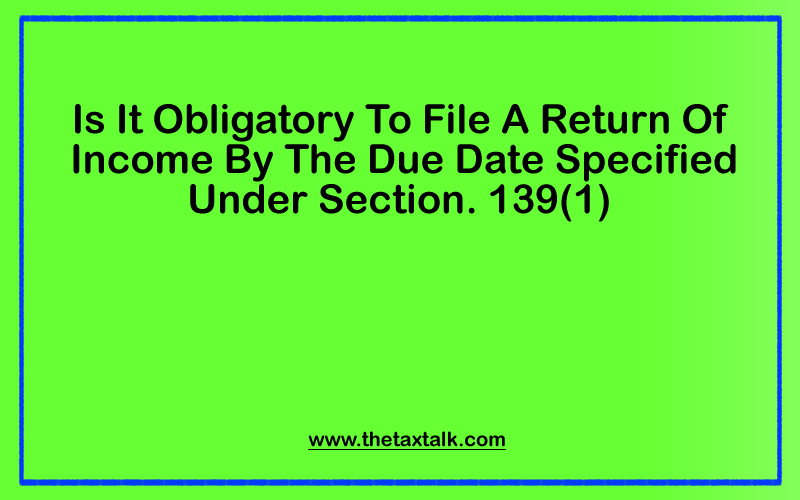![]()
IS IT OBLIGATORY TO FILE A RETURN OF INCOME BY THE DUE DATE SPECIFIEUNDER Section.139(1)
“Every person, if his total income or the total income of any other person in respect of which he is assessable under this Act during the previous year exceeded the maximum amount not chargeable to income-tax shall, on or before the due date, furnish a return of his income or of such other person during the previous year, in the prescribed form and verified in the prescribed manner and setting forth such other particulars as may be prescribed.”
By an Explanation to this section, `due date’ has been defined to mean as under:
(a) In the case of a company—31st December of the assessment year.
(b) In the case of a person other than a company, whose accounts are required to be audited under Income-tax Act or under any other law or in case of a co-operative society or in a case where report of an accountant is required under section 80HHC or section 80HHD—31st October of the assessment year.
(c) In a case where total income includes income from business or profession—31st August of the assessment year.
(d) In any other case—30th June of the assessment year.
It is to be noted here that the section uses the words `total income in respect of which he is assessable’ under this Act. The clear meaning of these words indicate that the maximum amount which is not chargeable to tax shall be arrived at by deducting amounts allowable as deduction under Chapter VI-A from the gross income. Thus agricultural income which is not chargeable to tax shall not form part of the total income for calculating the maximum amount not chargeable to tax.
For example: if the Rohan’s total income is, say Rs. 2,00,000 for assessment year 2017-18. Besides this, his income from bank interest is 6,000, and agricultural income is Rs. 10,000. Then the assessee is not obliged to file the return of his income because his total income for which he is assessable under the Act is only Rs. 2,00,000 (since Rs. 6,000 is exempt under section 80TTA and Rs. 10,000 is exempt under section10(1) of agricultural income), which does not exceed of the maximum amount not chargeable to tax. Thus, an obligation to file a return of income under section 139(1) arises only when the income exceeds the specified limit.
Again, an assessee is under no obligation to file a return under section 139(1), even in a case where his accounts are required to be audited under section 44AB, if his income is below the maximum amount not chargeable to tax. Thus, although he is required to file the audit report along with the return of income to be filed under section 139(1) to avoid heavy penalty under section 271B, yet he is not statutorily liable to file the return under section 139(1) as his total income is below the taxable limit. This is anamolous and needs an amendment in the Act. Thus when a return is not obligatory to file and there is no return on record under section 139(1) at all, it is impossible, rather ridiculous, to think of an audit report under section 44AB to be enclosed with it and consequently provisions of section 271B are not attracted.
Then there is another statutory provision under section 139(4), according to which an assessee has been given a statutory right to file a return within one year from the end of relevant assessment year or before completion of assessment, whichever is earlier. Here it is also pertinent to note that according to section 184, a certified copy of deed is to be filed alongwith the return of the year for which assessment as a firm is first sought. It does not specify any section, which means that it may be filed alongwith the return filed under section 139(1) or 142(1) or 139(4) or 148.
According to section 139(3), there is an option to the assessee to file a return under section 139(1) or not if he suffers a loss. The only condition is that if he wants that the loss should be carried forward, he would have to file the return within the time specified under section 139(1) to get the benefit of carry forward under various sections. He may not file a return at all if his income is below the taxable limit. This is also indicative of the fact that section 139(1) does not cast an obligation to file a return compulsorily within the time allowed under that section. It is only under certain circumstances that it shall be filed within the time specified in that section if the assessee wants to get some benefit out of it.
introduced section 234A. According to this section, if a person fails to file a return within the time allowed under section 139(1), he shall pay simple interest at 1% per month for the period of delay.
For Example: Priya has a total tax outstanding of Rs. 3,00,000 (Including net advance tax and TDS) Instead of filing her returns on July 31, she files it on January 15. She is now late by 6 months on the tax payment. Here’s how much she’s liable to pay:
Interest = 3,00,000 X 1% X 6 = 18000.

